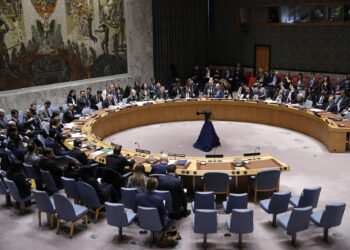Henri J. Barkey is the Cohen Professor of International Relations at Lehigh University and an adjunct senior fellow for Middle East studies at the Council on Foreign Relations.
عربی
President Joe Biden's landmark recognition last weekend of the Armenian genocide was received with predictable denunciations and denials in Turkey. Biden is the first U.S. president to call the massacre of 1.5 million Armenians, beginning in 1915 by a beleaguered Ottoman Empire, a genocide. Turkey, a long-standing and important NATO ally, had for years succeeded in deterring Washington from portraying the atrocities during and after World War I as such. Instead, every April 24—Armenia's official day of remembrance—American presidents have had to find words that would not upset the Turks.
Why the change now? Isn't the Biden administration, barely into its first 100 days, taking a risk in alienating an ally in Ankara?
The truth is, it's a different Washington today, after Turkish-American relations had reached a rare nadir over the course of the past few years. Whereas the Turkish government could once always rely on its friends on Capitol Hill, in the Pentagon and at the State Department to run interference on the Armenian genocide year after year, it now has few if any friends left in Washington. That is because of the number of deep policy disagreements between the U.S. and Turkey, and because of Turkish President Recep Tayyip Erdogan himself, who increasingly rules as an autocrat. So the argument advanced by most observers in Washington is that Biden had nothing to lose in finally recognizing the Armenian genocide.
But even acknowledging all of that, Biden's decision was also personal. The new president has, from the moment he entered office, practically confounded everyone. After an almost textbook career as a cautious and conciliatory senator, and a consciously low-key presidential campaign, Biden has surprised the country with the audacity of his plans. From his $1.9 trillion coronavirus relief package to his infrastructure proposals and willingness to take on climate change, Biden has demonstrated that he intends to be a very different president. His progressive ideas have been likened to those of Franklin D. Roosevelt and Lyndon B. Johnson.
Biden, in other words, wants to be a consequential president, unafraid to actually break with conventional wisdom and old shibboleths. In recognizing the Armenian genocide, he showed that he will not be deterred from doing what he thinks is right. He had, for most of his career as a senator, championed the Armenian cause. "Of course it's genocide," Biden reportedly said on the campaign trail in 2019.
Biden's declaration is a stark contrast with President Barack Obama, who had unequivocally promised to recognize the genocide during the 2008 presidential campaign. When the moment came, though, Obama proved timid and irresolute. Like other presidents before him, he feared alienating Turkey and studiously avoided saying "genocide." Obama went to great lengths to conjure up an Armenian word as a substitute: Meds Yeghern, which translates into the "great catastrophe." In his final year in office, Obama added a further description that still stopped short of genocide: "the first mass atrocity of the 20th century." But just months into his own presidency, Biden has unabashedly called a spade a spade and differentiated himself from his old boss, subtly demonstrating that he is decisive and not afraid to make hard decisions when needed.
As furious as the Turks are, they should congratulate themselves for having prevented the Americans from doing for so long what so many others have already done. Calls to punish Washington, no doubt, will abound in Ankara. Erdogan's spokesman has already vaguely threatened "a reaction of different forms and kinds and degrees." But the truth is that Turkey's hands are tied; it needs the U.S. far more than the U.S. needs Turkey, especially at a time when the Turkish economy and its currency are suffering from years of poor management under Erdogan and the current crisis of COVID-19. An all-out shouting match with the Biden administration, complete with other punitive measures, will not help the Turkish economy recover and attract much-needed foreign investment.
And Turkish policymakers will soon find that they have other things to worry about. The Biden administration is not going to withdraw its statement. What's more, U.S. recognition of the Armenian genocide is a different sort of problem for Turkey than the other issues dividing Washington and Ankara that affect relations on a daily basis.
Consider Turkey's purchase last year of the advanced Russian S-400 air defense system, despite warnings by both the U.S. and NATO that it would compromise the security and secrets of the new F-35 fighter jet. The U.S. then unceremoniously kicked Turkey off the F-35 program, at great cost. Turkey was not only going to purchase a large number of F-35s but was also an integral partner in the manufacturing of many of its components, which would have enabled it to export parts and thus earn much-needed foreign currency.
There are other serious rifts, most of all relating to America's alliance with Syrian Kurds to fight and contain the Islamic State in Syria. Erdogan has been feverishly opposed to this policy since 2014 and has done everything he could to sabotage it. The Turkish government, which has been battling its own Kurdish population politically and militarily for years, is worried that Syrian Kurds will gain some kind of autonomy just as their Iraqi brethren did in the 1990s with U.S. help. It sees America's support of the Kurds over the border in Syria as a dangerous threat to Turkey's own sovereignty.
Erdogan has not helped himself in Washington by acting like a bully, in the Eastern Mediterranean and elsewhere, always expecting that the U.S. will bend to his demands and continuously blaming the Americans for all of Turkey's problems, deepening anti-American sentiment at home. He has even taken this behavior to Washington itself, where members of Erdogan's own security detail infamously attacked a group of demonstrators, many of them American citizens, outside the Turkish ambassador's residence in 2017. A Turkish court has also gone so far as to arrest and prosecute three Turkish employees of the American consulate in Istanbul on terrorism charges, which U.S. diplomats call baseless.
Biden's genocide declaration, therefore, is unlikely to make matters any worse at this stage. Despite all their mutual antagonism, the fact of the matter is that Turkey and the U.S. still must cooperate on a whole range of issues they really cannot do without, from NATO and other mutual security interests to economic collaboration and trade. While relations are cold and won't be any warmer in the near future, Biden's long overdue recognition of the Armenian genocide will just take its place in the litany of what Erdogan simply sees as America's other nefarious acts.
![]()
Photo credit: Supporters of Armenia at a rally outside the Turkish Embassy in Washington on the day that President Joe Biden formally recognized the Armenian genocide, April 24, 2021. (Photo by Tasos Katopodis/Getty Images)






































